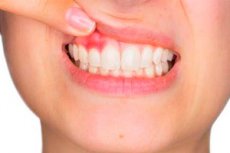New publications
Pulmonary obstruction worsens with the development of periodontitis
Last reviewed: 29.06.2025

All iLive content is medically reviewed or fact checked to ensure as much factual accuracy as possible.
We have strict sourcing guidelines and only link to reputable media sites, academic research institutions and, whenever possible, medically peer reviewed studies. Note that the numbers in parentheses ([1], [2], etc.) are clickable links to these studies.
If you feel that any of our content is inaccurate, out-of-date, or otherwise questionable, please select it and press Ctrl + Enter.

Pathogens that provoke the development of periodontitis, increase the activity of immune cells responsible for the relapse of progressive chronic obstructive pulmonary disease. This is the conclusion reached by experts representing the dental clinic of the Chinese University of Sichuan.
Chronic obstructive pulmonary disease is a progressive pathology in which irreversible changes occur in the respiratory tract, patency deteriorates, there is a wet cough, breathing becomes difficult. In periodontitis, the infection enters the gum tissue, an inflammatory reaction develops. Porphyromonas gingivalis microorganisms are considered important factors in the appearance of dysbiosis in the oral cavity, causing the high virulence of the disease.
Previously, scientists have already encountered information that periodontal inflammation worsens the condition of patients with chronic obstructive pulmonary disease, although the mechanism of the relationship remained incompletely understood. Chinese dentists have analyzed this disorder with the help of appropriate animal studies.
Several rats suffering from chronic obstructive pulmonary disease were infected with pathogenic microorganisms - Porphyromonas gingivalis - through the oral cavity. After that, changes in the microbiological composition of lung tissue were investigated - in particular, flow cytometry was performed and the immunofluorescence method was used. The experiment demonstrated that these microorganisms enhanced the multiplication in the lungs of such types of immunocytes as gamma-delta T-cells (agranular leukocytes) and M2-like macrophages. Stimulation of gamma delta T cells caused increased expression of proinflammatory markers (IFN-gamma and IL-17) and polarization of M2-like macrophages. At the same time, M2-polarized macrophages provide production of cytokines MMP9 and MMP12 activating the damaging reaction in lung parenchyma.
The researchers believe that the mechanism they discovered has the potential to significantly alter therapy strategies for chronic obstructive pulmonary disease. If we optimize periodontal treatment and direct it to inhibition of gamma-delta T-cells and M2-like macrophages, it is possible to achieve control over the deterioration of patients with chronic obstructive pulmonary disease.
Chronic obstructive pulmonary disease is the third most common cause of death worldwide. The vast majority of deaths from chronic obstructive pulmonary disease among patients under 70 years of age occur in underdeveloped countries. In developed countries, the development of the disease is primarily associated with tobacco smoking and inhalation of polluted air. The pathology is considered incurable, and treatment is aimed at alleviating the patient's suffering and eliminating painful symptoms.
Full details of the study can be found at aSM Journals
